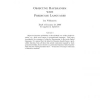Free Online Productivity Tools
i2Speak
i2Symbol
i2OCR
iTex2Img
iWeb2Print
iWeb2Shot
i2Type
iPdf2Split
iPdf2Merge
i2Bopomofo
i2Arabic
i2Style
i2Image
i2PDF
iLatex2Rtf
Sci2ools
SYNTHESE
2008
2008
Objective Bayesianism with predicate languages
Objective Bayesian probability is often defined over rather simple domains, e.g., finite event spaces or propositional languages. This paper investigates the extension of objective Bayesianism to first-order logical languages. It is argued that the objective Bayesian should choose a probability function, from all those that satisfy constraints imposed by background knowledge, that is closest to a particular frequency-induced probability function which generalises the = 0 function of Carnap's continuum of inductive methods. 1
Related Content
| Added | 15 Dec 2010 |
| Updated | 15 Dec 2010 |
| Type | Journal |
| Year | 2008 |
| Where | SYNTHESE |
| Authors | Jon Williamson |
Comments (0)

